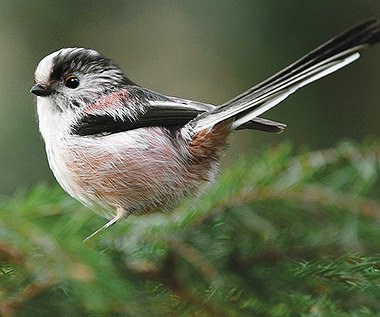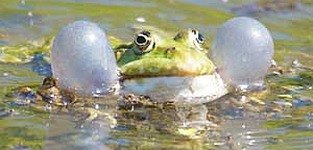Sussex Wildlife Trust: The ties that bind...
December 1st, 2020 Long-tailed tits and humans are two of Britain’s most social species. And just like a visit from your relatives, the arrival of a long-tailed tit flock in your garden can turn tranquillity into chaos
Long-tailed tits and humans are two of Britain’s most social species. And just like a visit from your relatives, the arrival of a long-tailed tit flock in your garden can turn tranquillity into chaos‘Who are these people?’ You’ve hardly seen them all year yet here you are, paper hat askew, squashed between them on the sofa at Christmas. On a branch out in the cold darkness of the garden, also sandwiched between aunts, brothers, cousins and daughters, a tiny bird is asking a similar question.
Long-tailed tits and humans are two of Britain’s most social species. And just like a visit from your relatives, the arrival of a long-tailed tit flock in your garden can turn tranquillity into chaos. It’s like someone has emptied a box of feathered fireworks over the fence. They manically bicker on the bird feeder and swing acrobatically upside-down on the fat balls, all the while trilling, rattling and screaming ‘eee-heee-heee’ like a troupe of Michael Jackson impersonators.
What you’re witnessing is a group of roving relatives, roaming the neighbourhood to pillage your peanuts. This posse of outlaws consists of in-laws, brothers, sons and daughters. With their gorgeous pink, black and white plumage and those ridiculously long tails, these flying lollypops must qualify for Britain’s cutest bird. Then, suddenly they’re gone and the pulse rate of the garden returns to normal.
By late winter the extended family will drift apart to find new partners, ready to start new families.
In March, the foundations are laid for an epic construction. Moss building bricks are lashed together with ropes of sticky spider’s webs. The walls rise, a camouflage cladding of lichen is added to the roof and a cosy filling of a thousand feathers lines the interior. The end result looks a crocheted stomach and soon there will be plenty of rumbling from inside as eight hungry chicks demand to be fed.
But raising a large family can take its toll. The constant hunt for insects can exhaust a parent almost to breaking point. And that’s when something unusual and wonderful happens. Their family arrives to save them. Aunties and uncles who have not been successful raising their own family that year will selflessly help the parents and feed their nephews and nieces.
Once the children have flown the nest the whole gang remains togeth er and joins with other siblings to form your chaotic neighbourhood feeding flock. But the biggest challenge of the year still awaits: winter.
Freezing night-time temperatures exact a heavy toll on our garden birds. And that’s why at Christmas, hidden deep in a hedge, you’ll find the extended family of long-tailed tits huddled together on a frosty branch, sharing their warmth and surviving.
Like them, we can all extend a warm wing to surround and support our family and friends this Christmas, whether near or far.
Because none of us can get through this on our own.
By Michael Blencowe: Learning & Engagement Officer, Sussex Wildlife Trust.
Sussex Wildlife Trust is an independent registered charity caring for wildlife and habitats throughout Sussex. Founded in 1961, we rely on the support of our members to help protect our rich natural heritage. Please consider supporting our work. As a member you will be invited to join Michael Blencowe on our regular wildlife walks and also enjoy free events, discounts on wildlife courses, Wildlife magazine and our guide book: Discovering Wildlife in Sussex.
It’s easy to join online at: www.sussexwildlifetrust.org.uk/join or T: 01273 497532.
long-tailed tit Alan Price Gatehouse Studio Sussex Wildlife Trust
Long-tailed tits and humans are two of Britain’s most social species. And just like a visit from your relatives, the arrival of a long-tailed tit flock in your garden can turn tranquillity into chaos. It’s like someone has emptied a box of feathered fireworks over the fence. They manically bicker on the bird feeder and swing acrobatically upside-down on the fat balls, all the while trilling, rattling and screaming ‘eee-heee-heee’ like a troupe of Michael Jackson impersonators.
What you’re witnessing is a group of roving relatives, roaming the neighbourhood to pillage your peanuts. This posse of outlaws consists of in-laws, brothers, sons and daughters. With their gorgeous pink, black and white plumage and those ridiculously long tails, these flying lollypops must qualify for Britain’s cutest bird. Then, suddenly they’re gone and the pulse rate of the garden returns to normal.
By late winter the extended family will drift apart to find new partners, ready to start new families.
In March, the foundations are laid for an epic construction. Moss building bricks are lashed together with ropes of sticky spider’s webs. The walls rise, a camouflage cladding of lichen is added to the roof and a cosy filling of a thousand feathers lines the interior. The end result looks a crocheted stomach and soon there will be plenty of rumbling from inside as eight hungry chicks demand to be fed.
But raising a large family can take its toll. The constant hunt for insects can exhaust a parent almost to breaking point. And that’s when something unusual and wonderful happens. Their family arrives to save them. Aunties and uncles who have not been successful raising their own family that year will selflessly help the parents and feed their nephews and nieces.
Once the children have flown the nest the whole gang remains togeth er and joins with other siblings to form your chaotic neighbourhood feeding flock. But the biggest challenge of the year still awaits: winter.
Freezing night-time temperatures exact a heavy toll on our garden birds. And that’s why at Christmas, hidden deep in a hedge, you’ll find the extended family of long-tailed tits huddled together on a frosty branch, sharing their warmth and surviving.
Like them, we can all extend a warm wing to surround and support our family and friends this Christmas, whether near or far.
Because none of us can get through this on our own.
By Michael Blencowe: Learning & Engagement Officer, Sussex Wildlife Trust.
Sussex Wildlife Trust is an independent registered charity caring for wildlife and habitats throughout Sussex. Founded in 1961, we rely on the support of our members to help protect our rich natural heritage. Please consider supporting our work. As a member you will be invited to join Michael Blencowe on our regular wildlife walks and also enjoy free events, discounts on wildlife courses, Wildlife magazine and our guide book: Discovering Wildlife in Sussex.
It’s easy to join online at: www.sussexwildlifetrust.org.uk/join or T: 01273 497532.
long-tailed tit Alan Price Gatehouse Studio Sussex Wildlife Trust
Comments (0)
No comments have been submitted yet.Why not be the first to send us your thoughts
Leave A Comment
Thank you for your comments, they will appear shortly once approved.
Recent Posts
Have You Seen...






